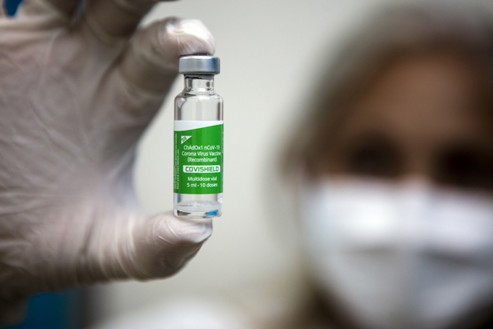
A health care worker holds a vial of the Oxford-AstraZeneca COVID vaccine on February 22, 2021 in Buenos Aires, Argentina. Denmark has stopped using the shot. Ricardo Ceppi/Getty Images
LAGOS MARCH 12TH (NEWSRANGERS)-Denmark and Iceland have both suspended use of the Oxford/AstraZeneca vaccine because of concerns surrounding fatal blood clots.
Denmark’s health minister Magnus Heunicke wrote in a tweet, translated from Danish: “The health authorities have, due to precautionary measures, suspended vaccination with AstraZeneca following a signal of a possible serious side effect in the form of fatal blood clots.
“It is currently not possible to conclude whether there is a connection. We act early, it needs to be thoroughly investigated.”
Danish health officials approved the vaccine’s use on March 5 for people aged over 65, citing evidence from a Scottish study.
Heunicke did not specify where the blood clot concerns had come from. Newsweek has contacted the Danish Health Authority for comment.
Iceland’s Chief Epidemiologist Þórólfur Guðnason said in a press briefing on March 11 that the country would also suspend use of the vaccine until more information became available from the European Medicines Agency, according to the Iceland Review.
The EMA said later on March 11 that countries could continue to administer the AstraZeneca jab while investigations were ongoing. It added: “The number of thromboembolic events in vaccinated people is no higher than the number seen in the general population.”
There is currently no evidence to show COVID vaccines have caused deaths or serious illnesses, aside from anaphylactic shocks.
The AstraZeneca vaccine was developed in the U.K. Phil Bryan, vaccines safety lead at the UK’s Medicines and Healthcare products Regulatory Agency, said in a statement on Thursday: “Vaccine safety is of paramount importance and we continually monitor the safety of vaccines to ensure that the benefits outweigh any potential risks.
“It has not been confirmed that the report of a blood clot, in Denmark, was caused by the COVID-19 Vaccine AstraZeneca. The Danish authorities’ action to temporarily suspend use of the vaccine is precautionary whilst they investigate.
“Reports of blood clots received so far are not greater than the number that would have occurred naturally in the vaccinated population. People should still go and get their COVID-19 vaccine when asked to do so.”
Stephen Evans, professor of pharmacoepidemiology at the London School of Hygiene and Tropical Medicine, who is not involved with the Oxford vaccine, said in a statement: “This is a super-cautious approach based on some isolated reports in Europe. The problem with spontaneous reports of suspected adverse reactions to a vaccine are the enormous difficulty of distinguishing a causal effect from a coincidence.
“This is especially true when we know that COVID-19 disease is very strongly associated with blood clotting and there have been hundreds if not many thousands of deaths caused by blood clotting as a result of COVID-19 disease. The first thing to do is to be absolutely certain that the clots did not have some other cause, including COVID-19.”
The move comes after Austrian authorities suspended one particular batch of AstraZeneca COVID jabs—batch number ABV5300—on March 7, when one person died and another became ill after receiving doses. The death was due to multiple thrombosis, a formation of blood clots in blood vessels, and the illness was pulmonary embolism.
The European Medicines Agency said on March 10 there was no indication the vaccination had caused the conditions.
Denmark has administered 759,160 doses of COVID vaccines so far, according to a Reuters analysis.
The U.K. keeps track of side-effects reported after COVID vaccination using its Yellow Card system. Under the system, anyone can voluntarily report suspected adverse reactions or side effects to a vaccine they have received. Yellow Card statistics were last released on March 4.
Between December 8 and February 21, the U.K. had given around 8.4 million doses of the Oxford/AstraZeneca vaccine and had received and analyzed 42,917 reports of suspected adverse reactions to the Yellow Card scheme.
In the same time period, the U.K. administered 9.4 million first doses of the Pfizer/BioNTech vaccine and had received and analyzed 29,715 Yellow Card reports from people who had received the vaccine.
In addition, the U.K.’s Medicines and Healthcare products Regulatory Agency said it had received 244 reports of suspected adverse events following AstraZeneca/Oxford vaccination in which the patient died shortly after receiving the jab, and 212 such reports for the Pfizer/BioNTech jab.
It said: “For both vaccines, detailed review of all reports has found that the overwhelming majority relate to injection site reactions (sore arm for example) and generalized symptoms such as a ‘flu-like’ illness, headache, chills, fatigue (tiredness), nausea (feeling sick), fever, dizziness, weakness, aching muscles, and rapid heartbeat.
“It is very important to note that a Yellow Card report does not necessarily mean the vaccine caused that reaction or event. We ask for any suspicions to be reported, even if the reporter isn’t sure if it was caused by the vaccine.”
This article has been updated with additional information about the AstraZeneca COVID vaccine, Iceland’s decision to suspend the vaccine, comments from Phil Byran and Professor Stephen Evans, and a statement from the EMA.
News Week










